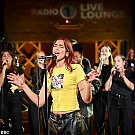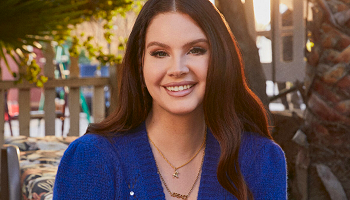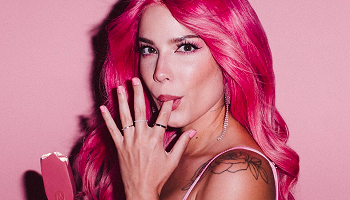Dua Lipa recently spoke to PRIDE.com about ‘Radical Optimism,’ her love for the gays, and picking herself up after learning tough lessons. PRIDE also inform Dua that she also made history by being the first woman to ever occupy the three top spots on the Billboard Hot Dance/Electronic Songs Chart (you can watch Dua reacting to this here). Read the interview below:
PRIDE: Congratulations on your new album Radical Optimism. The world could all use some optimism right now, so what does this record mean to you?
Dua Lipa: It’s about picking yourself up when things aren’t going your way. It’s about resilience. It’s about walking gracefully through chaos. That’s also been something that’s been a massive theme for me, because you do your most learning when you’re outside of your comfort zone. You can only be out of your comfort zone in uncomfortable situations and that’s where you do your most emotional maturing.Your confidence is seriously coming through the music. In fact, you just made history on the Billboard Hot Dance/Electronic Songs Chart by occupying the top three spots!
I did?!Yes! You just made history!
I didn’t know girl!Yes! Your three latest singles “Illusion,” “Houdini,” and “Training Season” are sitting at the top of the chart and it’s the first time a woman has ever done so.
Wow. I am so excited about this news. This is amazing. What a dream! It’s absolutely incredible to keep people dancing. Dance music has served as a safe space for so many people and to be able to be a part of that is amazing.One of the reasons your tracks are killing it right now is because of your passionate fanbase, which is largely LGBTQ+. How incredible does it feel knowing the queer community has supported you since day one?
I’m so grateful. It’s a community that’s just given me so much and has been so incredibly supportive. For me, the important thing is to give back to that community that’s given me so much, so I’m very grateful.You’re also one of the many women dropping an album during “Pop Girl Spring,” with top female artists such as Taylor Swift, Beyoncé, Ariana Grande, Billie Eilish, and many more releasing records this spring. What goes through your head when I say that out loud?
It’s amazing! I love being part of this wave of women and female artists that are taking charge. It’s so inspiring to be amongst so many incredible women.It’s seriously deserved. How would you say you’ve gotten to such a confident place in your life today?
Growing up and seeing that every experience, whether it’s good or bad, is a lesson and you learn something and you take something away from everything. That’s given me confidence to never see anything as a bad experience, but as a beautiful lesson.I love that so much. You’ve put out hits out for years and everyone has a favorite Dua Lipa song, but what would you say is your favorite hit you’ve released?
Oh gosh! I think “Illusion” is really one of my favorites right now, but from my last record… “Don’t Start Now.” Every time when I’m about to perform it on stage, it gets me very excited.What are you currently manifesting or working on that we should know about?
I’m always thinking about what’s next. I’m so focused on putting a really amazing tour together. I’ve got big shows coming up this summer. This is a bit of a new experience! My last record came out in the pandemic and then two years later, I’ve managed to tour it. Everything is happening so much quicker with this one, so let’s just see what happens!Speaking of touring, I actually saw the Future Nostalgia Tour and my favorite part was when you did the iconic shimmy dance at the end!
Oh you did?! You gotta come down for the next one! The little shimmy dance… you gotta do it! You gotta bring it back. You gotta remember where you started!Is there any artist you’d love to collaborate with one day?
I’d love to collaborate with André 3000! I’m a huge OutKast fan and he’s always been on the top of my list for sure.You’ve got so many amazing songs on Radical Optimismand I love that so many of your songs never leave the charts. How do you think you’ve cracked that code?
They’re just lingering around and sticking around for a long time! I’m grateful for it. There’s some crack in them somewhere!Before I let you go, do you have any positive messages you’ve love to send to your LGBTQ+ fans as they listen to this album?
I just want to send love to each and every single one of you. I am so grateful for all the love and support. I am here for you in every single way. Let’s just keep dancing!
Follow us on X/Twitter to stay updated.






















